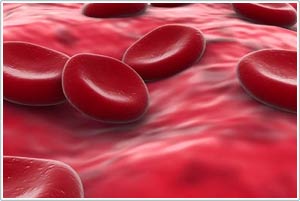Hereditary anemia helps the body fight malaria
Children with a genetic disorder with a blood disorder called alpha thalassemia often produce abnormally small blood cells, a form of mild anemia. Now, scientists discover this disorder is also helpful - it can protect children from one of the world's deadliest diseases, malaria.
According to Dr. Karen Day, lecturer and dean of the Department of Parasitic Medicine at New York University School of Medicine, who led the study with colleagues at Oxford University, ' We were surprised to discover hemoglobin levels. Smaller in many blood cells work against malaria. ' Hemoglobin is a protein that carries oxygen in red blood cells.
The new work shows how children with mild form of alpha thalassemia can be protected against malaria anemia. The study, published in the March issue of PLoS Medicine, offers a solution to a phenomenon that occurred more than 50 years ago.
About 800 children live in Papua, New Guinea, participating in the project. Malaria is an epidemic in Papua New Guinea and about 68% of children here suffer from alpha thalassemia. Dr. Day and Freya graduate student JI Fowkes and colleagues from Oxford University, Papua New Guinea Medical Research Institute, and Swansea University show that a severe round of malaria attacks takes one to three to one. / 2 total red blood cells in the body, equivalent to millions of millions of units in a liter of blood.Children with alpha thalassemia can survive the attack because they themselves have more red blood cells than children without 10 to 20% of the disease .
 Dr. Day said: 'This is too simple and remarkable. Children with alpha thalassemia have adapted to the loss of malaria-related red blood cells by producing more cells with less hemoglobin. So children can pass when they have more hemoglobin after they have seizures than normal children. '
Dr. Day said: 'This is too simple and remarkable. Children with alpha thalassemia have adapted to the loss of malaria-related red blood cells by producing more cells with less hemoglobin. So children can pass when they have more hemoglobin after they have seizures than normal children. '
Malaria has been a disaster for thousands of years. Pathogenic parasites spend most of their lives inside human red blood cells, which are eventually destroyed by them. Children with malaria will experience severe anemia when losing blood cells leading to less hemoglobin than 50g / liter.
Malaria is more than hundreds of millions of people and causes nearly 2 million deaths every year in Africa and Asia. Most victims are children. In some parts of the world, malaria is a plague, a variant that has emerged and helped humans survive.
Nearly 60 years ago a renowned advanced biologist, JBSHaldane, declared that thalassemias are popular with people because they help us fight malaria. Alpha thalassemia is common in Asia, the Mediterranean and Melanesia, where the epidemic is common. In the mid-1990s, scientists working on the north coast of Papua New Guinea demonstrated that children with mild alpha thalassemia, those who inherited the ' alpha ' part of the hemoglobin gene from their parents, would be protected. from malaria. These children are about 60% less likely to have anemia than normal children, but the protection mechanism has not yet been discovered.
Dr. Day and his colleagues carried out their work on the same group of children.'We are offering an unexpected protection mechanism against severe anemia due to malaria. We have shown that alpha thalassemia benefits children by producing more red blood cells. '
According to the National Institute of Human Genetics, National Institutes of Health Research, individuals with Alpha thalassemia have different levels of severity. The most severe in the form of Alpha thalassemia, commonly found in Southeast Asia, China and the Philippines, causes fetal death or premature death.
- Using stem cells to treat genetic anemia
- Viagra helps fight malaria
- Change the environment to fight malaria
- Over 10 million USD helps Vietnam fight HIV / AIDS
- New way to fight malaria
- Anemia
- Malaria changes the smell of patients, makes them more
- How to diagnose, treat and prevent malaria
- Young anemia and identification signs
- Mutant mosquitoes fight malaria
- 847 million USD for the fight against AIDS, tuberculosis and malaria
- The first vaccine against malaria loses its effectiveness after 4 years of injection
 Green tea cleans teeth better than mouthwash?
Green tea cleans teeth better than mouthwash? Death kiss: This is why you should not let anyone kiss your baby's lips
Death kiss: This is why you should not let anyone kiss your baby's lips What is salmonellosis?
What is salmonellosis? Caution should be exercised when using aloe vera through eating and drinking
Caution should be exercised when using aloe vera through eating and drinking Seeds became the 'secret weapon' that helped 4 children in a plane crash survive 40 days in the forest
Seeds became the 'secret weapon' that helped 4 children in a plane crash survive 40 days in the forest  Dangerous diseases that require vaccination from a young age
Dangerous diseases that require vaccination from a young age  If you put babies together without anyone teaching them to speak, will a new language emerge?
If you put babies together without anyone teaching them to speak, will a new language emerge?  The concubines, though favored by the king, had no children: An autopsy revealed the truth!
The concubines, though favored by the king, had no children: An autopsy revealed the truth!  How important are micronutrients to the human body?
How important are micronutrients to the human body?  Ancient Handprints on the Qinghai-Tibet Plateau: Unique Evidence of Human Evolution
Ancient Handprints on the Qinghai-Tibet Plateau: Unique Evidence of Human Evolution 